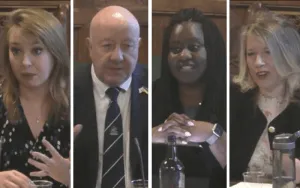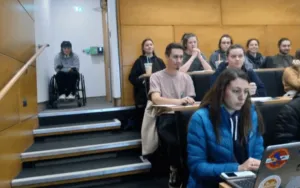User-led organisations have played a key role in two major new projects that aim to improve access for disabled tourists and ramblers.
In Oxfordshire, Natural England has opened the National Land Access Centre (NLAC), which will provide training for landowners, farmers and rights of way officers on how to ensure that gates and other countryside obstructions are accessible to disabled people.
And in Lancashire, Blackpool-based disabled people’s organisation (DPO) Disability First is celebrating a government grant of nearly £1 million for a project that will improve access to the Fylde, Wyre and Blackpool coastline.
NLAC, based at Aston Rowant National Nature Reserve, will offer training courses that show how to use, maintain and install fences, barriers and stiles that meet a new British Standard, which was published in February.
Natural England, the government’s advisers on the natural environment, has worked closely on the plans with the user-led charity Disabled Ramblers, and project partners The British Horse Society, the specialist gate supplier Centrewire and the Pittecroft Trust.
John Cutherbertson (pictured at the new centre), chair of Disabled Ramblers, told Disability News Service (DNS): “There is a huge swathe of the population who cannot clamber over stiles.
“What we found is the main thing that stops people accessing the countryside is the lack of understanding by those people who are putting these gates in.
“Some of them still think that the less able would prefer to stay at home and watch the telly.
“They don’t realise that people want to get out there and need to get out there for their mental health as well as their physical well-being.”
He said Disabled Ramblers was trying to educate these groups, such as farmers, landowners and rights of way officers, about the “least restrictive” way to enclose land, and ideally install gates that disabled people can open and close on their own, without needing someone with them.
He said he hoped that the selection of gates and barriers on show at the centre would grow and would be joined eventually by accessible versions of other equipment, such as bridges and boardwalks.
Disabled Ramblers has provided an off-road mobility scooter to the centre so people who take the courses can use the vehicle to see how difficult it can be to manoeuvre through such obstacles.
Cuthbertson said that Centrewire, which was founded by Tom Bindoff, a non-disabled member of Disabled Ramblers, had been keen to modify its products to make them more accessible.
Bindoff has even designed a “kissing gate” that can be opened by a scooter-user using a RADAR key, he said.
The disabled Tory peer Lord Blencathra, deputy chair of Natural England, said: “Improved access will help to connect more people with their natural environment, giving them a chance to enjoy our countryside, its open space and fascinating wildlife – all key aspects of the government’s 25 year environment plan.”
Meanwhile, funding of £985,000 has been awarded to a consortium led by Disability First through the government’s Coastal Communities Fund.
Alan Reid, chief executive of Disability First, said his organisation was “thrilled and very proud” to be awarded the funding in its 25th year as a charity.
He said he wanted the Fylde, Blackpool and Wyre coast to “strive to become a more truly inclusive resort”.
The Access Fylde Coast project is supported by Blackpool, Fylde and Wyre councils, Blackpool Transport, Marketing Lancashire, Lancaster University, the access information provider DisabledGo, Blackpool’s Coastal Community Team and the area’s local Volunteering Centre.
Reid said the project, which will last nearly two years, was “exciting and unique”.
He told DNS the scheme would improve access for both visitors and residents by offering free access audits and disability awareness training to local shops and businesses.
The project will also develop a culture and heritage mobile phone app, linked to existing apps offered by Blackpool Transport and DisabledGo, and which will include a British Sign Language interpretation service.
He said: “This will support people with a variety of disabilities with tram and bus access once they step off the train station in Blackpool and venues will have details of their particular disabled facilities and heritage information on the app.”
The project also plans to showcase professional disabled performers at Blackpool Opera House theatre and disabled artists in a local art gallery, and improve access at existing events including the Blackpool Illuminations switch-on and Lytham Festival.
He said there was also the possibility that a disabled performer could perform at, or even switch on, the illuminations next year.
On a visit to Lytham Saint Annes, coastal communities minister Jake Berry said: “It’s really exciting to see money from the Coastal Communities Fund help kick-start these shovel-ready projects, which have the potential to unlock the barriers to development and growth in our coastal communities.”
The Coastal Communities Fund was established to support coastal projects in the UK to deliver sustainable growth and jobs.
Picture by Annette Venters
A note from the editor:
Please consider making a voluntary financial contribution to support the work of DNS and allow it to continue producing independent, carefully-researched news stories that focus on the lives and rights of disabled people and their user-led organisations.
Please do not contribute if you cannot afford to do so, and please note that DNS is not a charity. It is run and owned by disabled journalist John Pring and has been from its launch in April 2009.
Thank you for anything you can do to support the work of DNS…

 Disabled peers speak of ‘daily fight’ against access barriers in House of Lords
Disabled peers speak of ‘daily fight’ against access barriers in House of Lords Lords is ‘aeons ahead’ of Commons on access, disabled MP tells colleagues
Lords is ‘aeons ahead’ of Commons on access, disabled MP tells colleagues Impact of loneliness on young disabled people is ‘wide-reaching’, new research finds
Impact of loneliness on young disabled people is ‘wide-reaching’, new research finds